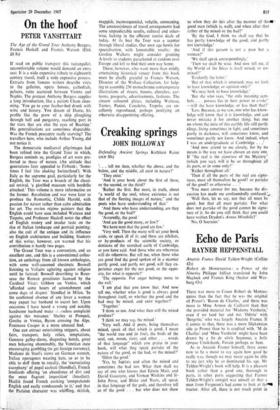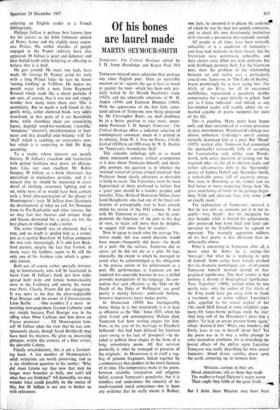Echo de Paris
RAYNER HEPPENSTALL
Robert de Montesquiou : a Prince of the Nineties Philippe Jullian translated by John Haylock and Francis King (Seeker and War- burg 63s) There was more to Count Robert de Montes- quiou than the fact that he was the original of ,Proust's 'Baron de Charlus,' and there was more to Mme Arman de Caillavet than that she provided material for 'Madame Verdurin,' even if we land her and not 'Odette' with 'Bergotte,' who was largely Anatole France. If it comes to that, there was a more Dickensian side to Proust than he is credited with. 'M de Charlus' and `Mme Verdurin' might have been drawn by a fin de siecle Seymour, a belle époque Cruikshank, Forain perhaps or Sem.
As to Anatole France' himself, there seems now to be a move to say again how good he really was, though we may never again be able to see just why he so dominated his age. Mr Tylden-Wright's book will help. It is a pleasant book rather than a good one, thorough in parts, in other parts suggesting that Farmer Tylden-Wright's cowgirl was unwell or that a man from Ferguson's had come to look at th01141 tractor. After all, there is not much point in
referring an English bibliography.
Philippe Jullian is perhaps best known here for his jackets to the John Lehniann edition of Henry James and the slightly more expen- sive Proust. His verbal sketches of people engaged in the Proust industry have also appeared. M Jullian is quiet and debonair and likes boiled lamb while believing or affecting to believe that it is beef.
He gets around. He must, one feels, have made Mr George D. Painter grind his teeth with a long Proust letter he says he found `among kindling' at Vallieres. He makes my mouth water with a note from Raymond Roussel which reads like a clever pastiche (I am sure, of course, that it was not and simply wonder how many more there are). This is serendipity. But so much is well found in this gently witty, rather cluttered book, very oddly translated, in that parts of it are beautifully done, while elsewhere there are astonishing lapses,, hopeful word-for-wordisms ('sensible,' 'mundane,' abusivel misinformation in foot- notes and that dreadful mid-Atlantic 'will' for 'shall' which is catching on everywhere now, but which it is surprising to find Mr King accepting.
To a reader whose interests are mainly literary, M Jullian's visualism and fascination with period furniture may prove an obstruc- tion.: Like our own excellent Mr Robin Jacques, M Jullian, as a book illustrator, has specialised in meticulous pastiche, and it is natural that he should be interested in every detail of clothing. ornament, lighting and so on, while most of us would have been content with a brief characterisation of the phases of Montesquiou's taste: M Jullian does illuminate the development of what we call Art Nouveau from. its Pre-Raphaelite and other sources, but we may feel that theatres and antique shops and houses decorated for a party are not the best places in which to study-a writer.
The writer himself was so -cluttered, that is true, and no doubt it spoiled him as a writer, just as-it spoiled Beckford. M Jullian compares the two very interestingly. It odd how Beck- ford, persists, despite the fact that Vathek, in many ways the feeblest, seems to be still the only one of his Arabian tales which is gener- ably, known.
Both are, of course, rather specially interest- ing to homosexuals, who will be fascinated to learn from M Jullian's book just how wide- spread both male and female homosexuality were in the Faubourg and among the newer tout Paris. Clearly, Proust did not exaggerate. It was news to me that the ultra-respectable Paul Bourget and the owner of L'Intransigeant, Leon Bailby . . One wonders if a more in- teresting newspaperman, Gaston Calmette (and not simply because Paul Bourget was in the offing when Mme Caillaux shot him down on Figaro premises) . . . Of Montesquiou him- self M Jullian takes the view that he was con- spicuously chaste, though Sarah Bernhardt may, have been his mistress. He gives us interesting glimpses, within this context, of a finer writer, the adorable Colette.
Finally unsatisfactory, this is yet a fascinat- ing book. A fair number of Montesquiou's adult witticisms are worth preserving, and so is the childhood question to his nanny:- 'Why did Aunt Leonie say that now that men no longer wear breeches at balls, one can't tell what they are thinking?' All donnishly, we may wonder what, could possibly be the source of this, but M Jullian is not one to bother us, with references.
reader to a French











































 Previous page
Previous page